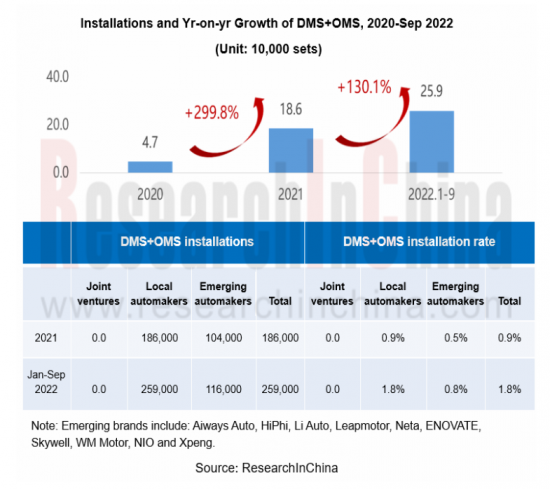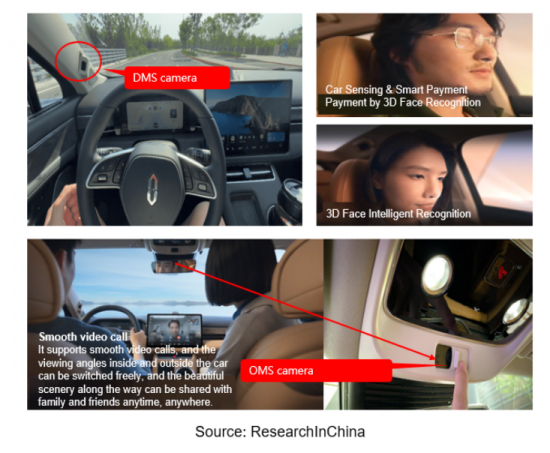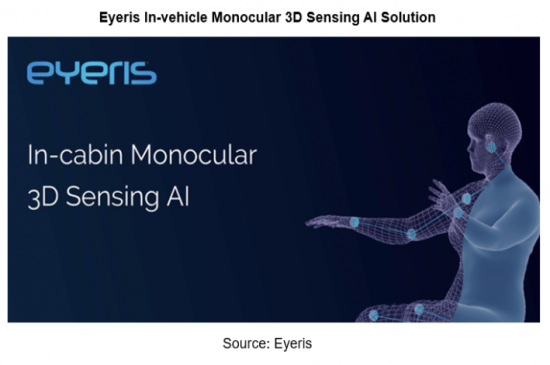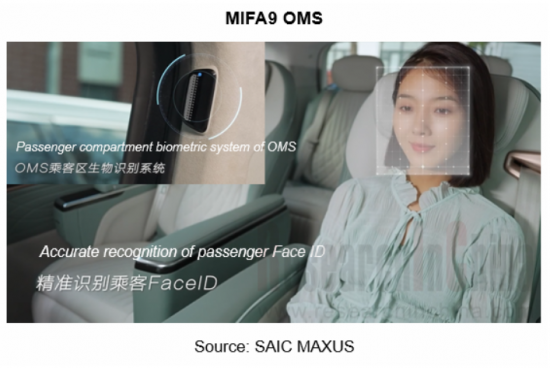 |
市場調查報告書
商品編碼
1187319
車載用DMS/OMS (駕駛者/乘務員監控系統):2022年Automotive DMS/OMS (Driver/Occupant Monitoring System) Research Report, 2022 |
||||||
從2022年1月到9月引進的車載用DMS/OMS (駕駛者/乘務員監控系統) 為25萬9,000套,與前一年同期比較增加130.1%,引進率與前一年同期比較成為約上升9點的1.8%。其中,新興汽車製造商DMS+OMS的裝載數是11萬6,000套,佔44.6%。
本報告提供車載用DMS/OMS (駕駛者/乘務員監控系統) 產業調查,產業概要,車載用記憶體晶片的類型與用途,記憶體晶片的汽車情境,海外及中國國內的車載用記憶體晶片供應商的分析等彙整資料。
目錄
第1章 客艙感測技術及DMS/OMS的引進
- 客艙感測概要
- DMS的運行原理
- DMS的主要的技術途徑和感測器解決方案
- DMS相機的安裝位置
- DMS紅外線相機光源
- 主要的OMS感測器解決方案
- OMS相機的安裝位置
- DMS相機和OMS相機的比較
- DMS+OMS的引進數
- DMS/OMS的引進數
- DMS的引進數:各價格
- 前20名品牌的DMS引進數
- 前20名車輛類型的DMS引進數
- OMS引進數:各價格
- 前20名品牌的OMS引進數
- 前20名車輛類型的OMS引進數
第2章 客艙感測連鎖相關公司
- Cabin Monitoring Industry Chain
- Horizon Robotics
- Xilinx
- Orbbec
- Melexis
- Emotion3D
- Eyeris
- Tobii
- Jungo
第3章 車內監測政策與市場趨勢
- 車內監測的市場政策
- 車內監測的市場趨勢
第4章 由於車內監控系統:OEM的適用案例
- 典型的OEM間的DMS解決方案的比較
- 典型的OEM間的OMS解決方案的比較
- GAC Trumpchi EMKOO
- AITO M5
- ARCFOX αS New HI Edition
- Volvo EX90
- Mercedes-Benz EQE
- SAIC MAXUS MIFA 9
- Rising Auto R7
- Changan Ruicheng PLUS
- Cadillac LYRIQ
- 2023 Jetour X90 Zilong
- ZEEKR 001
第5章 中國的車內監測供應商
- 摘要:中國的車內監測解決方案
- ArcSoft
- SenseTime
- Baidu
- ThunderSoft
- Hikvision
- Autocruis Technology
- MINIEYE
- Neusoft Reach
- Roadefend Vision
- Jingwei HiRain
- Tsingtech Microvision
- UNTOUCH
- Calmcar
- SiNOCHiPAi
- VIA Technologies
- ADASPLUS
- 7invensun
第6章 海外車內監測供應商
- 車內監測解決方案的比較:DMS
- 車內監測解決方案的比較:OMS
- Valeo
- Denso
- Hyundai Mobis
- Visteon
- Bosch
- Veoneer
- Aptiv
- Continental
- Magna
- Mitsubishi Electric
- Harman
In-cabin Monitoring Research: In the first nine months of 2022, the installations of DMS+OMS swelled by 130% yr-on-yr with visual DMS/OMS as the mainstream solution
Local manufacturers are keen to deploy DMS and OMS simultaneously
According to the statistics of ResearchInChina, 259,000 sets of DMS+OMS were installed from January to September 2022, a year-on-year spike of 130.1%; the installation rate hit 1.8%, up about 9 percentage points year on year. Among them, 116,000 sets of DMS+OMS were installed by emerging automakers, accounting for 44.6%.

Trumpchi GS8, NIO ES6 and AION Y are the top three models by DMS+OMS installations. Representative models equipped with DMS and OMS simultaneously include AITO M5, SAIC MAXUS MIFA 9, JETOUR X70, Neta U, NIO ET7, Changan UNI-K, Li L9, Voyah FREE, Changan COS Z6, HAVAL Shenshou and so on.


The OMS of OEMs is mainly based on visual solutions, of which radar solutions account for a rising proportion
92.1% of OEM OMS solutions adopt visual solutions, of which radar solutions account for a rising proportion. From January to September 2022, the proportion of OMS solutions using radar increased from 1.9% a year ago to 2.3%. The representative models include Latte, Mocha and Lynk & Co 01, mostly fuel and hybrid models.

For example, Mocha New Energy is equipped with the rear life monitoring system with a radar solution. When a life is sensed to stay in the car within 90 seconds after the car is locked, the system will make the car whistle, and send text messages and APP notifications to remind the car owner. Even if the car owner cannot return in time, the car will automatically open the sunroof to dissipate the heat inside when the temperature exceeds 23°C.
In addition, some manufacturers have introduced in-cabin monitoring solutions combining radar and cameras, both of which can exert their advantages. In October 2021, Continental developed an integrated solution for cabin sensing. The cockpit sensing system combines camera data with radar sensors and intelligent algorithms to cover the entire vehicle interior. After the car is locked, the cabin sensing technology can detect the child left behind through the radar sensor and the stored object classification algorithm, and then issue an alarm. In the future, cabin sensing will be able to measure and evaluate not only object movements but also health parameters such as pulse, breathing rate, and body temperature as well as emotions of drivers and passengers.

In March 2021, PathPartner, an expert in product development and engineering, developed an occupant monitoring sensor (OMS) that utilizes 4D radar technology combined with camera fusion. It's designed to supplement a camera-based vehicle occupancy monitoring system. PathPartner's camera sensor with near-infrared illumination enables reliable performance under different lighting conditions. PathPartner's 4D radar technology can be used to detect subtle movement or even a person's breath in a vehicle's interior, such as a sleeping child under a blanket or the presence of pets.
Current R&D focuses on DMS/OMS with a single camera
At present, DMS and OMS usually require two cameras. If a single RGB-IR wide-angle OMS camera is used to cover all functions of DOMS (driver and occupant monitoring system), the cost will be cut down on the premise of ensuring the algorithm accuracy.
For example, in September 2022, Eyeris introduced a monocular 3D sensing AI solution which obtained additional depth data about drivers, passengers, objects and surfaces through a single 2D RGBIR image sensor. Eyeris uses proprietary technology that accurately regresses depth information with 3D output from 2D image sensors, which applies to all in-cabin features. It is achieved through rigorous collection of naturalistic in-cabin 3D data to train compute-efficient depth inference models that run on AI-enabled processors. The data generated can be used to map the interior of a car, for example, and accurately determine in three dimensions the location of occupants' face, body, hands, objects and everything else inside the car.

In January 2022, emotion3D and onsemi announced a joint reference design for driver and occupant monitoring system (DOMS). Based on emotion3D's CABIN EYE AI software stack and the award-winning AR0820AT 8.3 MP image sensor from OnSemi, this new DOMS solution not only replaces the single-task driver monitoring mono/IR camera, but also enables multiple use cases for safety and convenience by employing a single color/IR camera.
The integration of DMS and ADAS promotes the integration of DMS algorithms and chips
DMS is gradually merging with ADAS to detect whether the driver is in the best condition to take over the vehicle at any time. At the same time, it also prompted the DMS algorithm to be embedded in the main chip of ADAS, so as to ensure the driver's safety when using intelligent driving function.
For example, ArcSoft cooperates with Qualcomm to provide DMS directly by using part of the redundant computing power of Qualcomm intelligent driving chip on Qualcomm 8155 or Qualcomm's next generation chip.
In January 2022, Seeing Machines announced a collaboration with Ambarella to bring integrated ADAS and occupant and driver monitoring system (OMS and DMS) solutions to the market. This unique technology combination will bring Seeing Machines' industry leading OMS and DMS technology solutions to Ambarella's CV2x CVflow® family of edge AI perception systems on chip (SoCs).
Mobileye plans to mass-produce its next-generation EyeQ6 computing platform in 2023-2024, which will be preset with an embedded vision DMS algorithm which is presumably provided by Cipia, an AI computer vision in-cabin automotive solution provider. Cipia has integrated its DMS algorithm into TI TDA4VM SoC and put it on RX5 MAX of SAIC Roewe, and now it has started mass production.
In addition to the field of intelligent driving, the function extension of DMS/OMS is reflected in intelligent cockpits.
In addition to the basic fatigue and distraction detection, the in-cabin monitoring system based on a vision solution has expanded functions in the field of intelligent cockpits, such as personalized IVI interface login, personalized cockpit settings, multimodal interaction with the combination of DMS lip reading and voice system, etc., so as to rapidly improve the user experience.

MIFA 9 is equipped with dual OMS on B-pillar. After passengers take seats at the second row of the car, their faces are automatically recognized. According to the account bound to the current face, the personalized settings are synchronized. When the second-row passengers exchange seats, the original seat configuration will be seamlessly applied to the current seats. In addition, the eye movement control function can recognize the line of sight of the passengers at the second row, and control the sunroof, air conditioning, side windows, etc. by combining the armrest screen gestures.
The DMS of Changan CC PLUS supports Face ID, and automatically completes the settings of seats, lighting, automotive applications and so on according to the memory of the user's previous driving habits. It can monitor whether the driver shows signs of fatigue such as yawning and squinting, and remind the driver through voice, light, music, etc.. Combined with "lip reading" function of DMS, "AI Xiaoan" intelligent voice system can recognize the operation instructions spoken by the car owner through lip reading.
The DMS of ZEEKR 001 features Face ID, fatigue monitoring, distraction detection, eye tracking, eyes on road, special action warning, etc.
In the future, with the improvement of DMS/OMS algorithms and hardware, more application scenarios of the in-cabin monitoring system will be unlocked, and product premium will further jump.
Table of Contents
1 Cabin Sensing Technology and DMS/OMS Installations
- 1.1 Overview of Cabin sensing
- 1.2 DMS Working Principle
- 1.3 Major Technical Routes and Sensor Solution of DMS
- 1.4 DMS Camera Installation Position
- 1.5 DMS Infrared Camera Light Source
- 1.6 Main OMS Sensor Solutions
- 1.7 OMS Camera Installation Positions
- 1.8 Comparison between DMS and OMS cameras
- 1.9 DMS+OMS Installation
- 1.10 DMS/OMS Installations
- 1.11 DMS Installations by price
- 1.12 DMS Installations by brand TOP20
- 1.13 DMS Installations by vehicle type TOP20
- 1.14 OMS Installations by Price
- 1.15 OMS Installations by Brand TOP20
- 1.16 OMS Installations by Vehicle Type TOP20
2 Cabin Sensing Chain and Related Companies
- 2.1 Cabin Monitoring Industry Chain
- 2.2 Horizon Robotics
- 2.2.1 Profile
- 2.2.2 Chip Iteration History
- 2.2.3 DMS
- 2.2.4 Collaborative Application of Horizon Journey Chip In-cabin Monitoring
- 2.3 Xilinx
- 2.3.1 Profile
- 2.3.2 Iteration of In-cabin Monitoring Chip
- 2.3.3 In-cabin Monitoring System
- 2.3.4 Collaborative Application of Xilinx Chips In-cabin Monitoring
- 2.4 Orbbec
- 2.4.1 Profile (Shenzhen Oradar Technology)
- 2.4.2 In-cabin Monitoring Solutions
- 2.4.3 3D Vision DMS
- 2.5 Melexis
- 2.5.1 Profile
- 2.5.2 Iteration of In-Cabin ToF Sensors
- 2.5.3 Functions of Melexis In-cabin ToF Sensors
- 2.5.4 Collaborative Application of Melexis Chip In-cabin Monitoring
- 2.6 Emotion3D
- 2.6.1 Profile
- 2.6.2 Emotion3D DMS
- 2.6.3 Emotion3D OMS
- 2.6.4 Emotion3D Autonomous Minibus Occupant Monitoring
- 2.6.5 Emotion3D Cooperation Dynamics
- 2.7 Eyeris
- 2.7.1 Profile
- 2.7.2 Eyeris In-cabin Monocular 3D Sensing AI
- 2.7.3 Eyeris Core Technologies
- 2.7.3 Eyeris Core Technologies
- 2.7.4 Eyeris Cooperation Dynamics
- 2.8 Tobii
- 2.8.1 Profile
- 2.8.2 Tobii DMS Software
- 2.8.3 Tobii DMS Introduction
- 2.9 Jungo
- 2.9.1 Profile
- 2.9.2 Jungo In-cabin Solutions: CoDriver
3 In-Cabin Monitoring Policy and Market Trends
- 3.1 In-Cabin Monitoring Market Policy
- 3.1.1 Summary of In-cabin Monitoring Regulations and Policies
- 3.1.2 Foreign Policies
- 3.1.3 Domestic Policies (1)
- 3.1.3 Domestic Policies (2)
- 3.2 In-cabin Monitoring Market Trends
- 3.2.1 Trend 1: Local OEMs Are Keen To Deploy DMS and OMS at the Same Time
- 3.2.2 Trend 2: The Application of Radars in OMS Solutions Become Widespread
- 3.2.3 Trend 3: Mutual Fusion between In-cabin Monitoring Sensors
- 3.2.4 Trend 4: In-cabin Cameras Will Be Upgraded From 2D to 3D
- 3.2.5 Trend 5: The Solution of Implementing DOMS Function with A Single Camera Has Become A R&D Direction of SUPPLIERS
- 3.2.6 Trend 6: Single LED Light Source DMS
- 3.2.7 Trend 7: Integration of In-cabin Surveillance Cameras and Displays
- 3.2.8 Trend 8: Integration of In-cabin Surveillance Cameras and Interior Rearview Mirror
- 3.2.9 Trend 9: Integration of DMS and AR HUD
- 3.2.10 Trend 10: Integration of DMS and Speech Perception
- 3.2.11 Trend 11: Integration with ADAS
- 3.2.12 Trend 12: Integration with Cockpit Domain
- 3.2.13 Trend 13: In-cabin Monitoring System Functions Tend To Be Personalized and Customized
4 In-Cabin Monitoring System Application Cases of OEMS
- 4.1 Comparison of DMS Solutions between Typical OEMs (1)
- 4.1 Comparison of DMS Solutions between Typical OEMs (2)
- 4.2 Comparison of OMS Solutions between Typical OEMs (1)
- 4.2 Comparison of OMS Solutions between Typical OEMs (2)
- 4.3 GAC Trumpchi EMKOO
- 4.4 AITO M5
- 4.5 ARCFOX αS New HI Edition
- 4.6 Volvo EX90
- 4.7 Mercedes-Benz EQE
- 4.8 SAIC MAXUS MIFA 9
- 4.9 Rising Auto R7
- 4.10 Changan Ruicheng PLUS
- 4.11 Cadillac LYRIQ
- 4.12 2023 Jetour X90 Zilong
- 4.13 ZEEKR 001
5 Chinese In-Cabin Monitoring Suppliers
- 5.1 Summary of In-Cabin Monitoring Solutions in China (1)
- 5.1 Summary of In-Cabin Monitoring Solutions in China (2)
- 5.2 ArcSoft
- 5.2.1 Profile
- 5.2.2 In-Cabin Monitoring System
- 5.2.3 In-Cabin Monitoring Business Pattern
- 5.2.4 Partners
- 5.3 SenseTime
- 5.3.1 Profile
- 5.3.2 DMS/OMS Solution and Technology
- 5.3.3 DMS
- 5.4 Baidu
- 5.4.1 Profile
- 5.4.2 Fatigue Driving Monitoring System
- 5.4.3 DMS Software
- 5.5 ThunderSoft
- 5.5.1 Profile
- 5.5.2 DMS Solution
- 5.5.3 Application of ThunderSoft DMS: Intelligent Cockpit 6.0
- 5.6 Hikvision
- 5.6.1 Profile
- 5.6.2 Automotive Business
- 5.7 Autocruis Technology
- 5.7.1 Profile
- 5.7.2 Product Roadmap
- 5.7.3 DMS/OMS
- 5.7.4 DMS-Based Voice and Vision Integration Solution
- 5.7.5 Cooperation in and Application of DMS
- 5.8 MINIEYE
- 5.8.1 Profile
- 5.8.2 DMS
- 5.8.3 Core In-Cabin Sensing Technologies
- 5.8.4 In-Cabin Sensing Solution (I-CS)
- 5.8.5 Advantages of I-CS
- 5.8.6 Major Customers
- 5.9 Neusoft Reach
- 5.9.1 Profile
- 5.9.2 DMS Solution
- 5.10 Roadefend Vision
- 5.10.1 Profile
- 5.10.2 Core DMS Technologies
- 5.10.3 DMS Products: Driver Status Analysis and Warning Equipment
- 5.10.4 Active Safety Cloud Platform - Driver Behavior Big Data Analysis
- 5.10.5 Partners
- 5.11 Jingwei HiRain
- 5.11.1 Profile
- 5.11.2 DMS/OMS Camera Development
- 5.11.3 DMS
- 5.12 Tsingtech Microvision
- 5.12.1 Profile
- 5.12.2 Drowsy Driving Warning System
- 5.12.3 Driving Guardian
- 5.12.4 Intelligent Video Surveillance Terminal
- 5.13 UNTOUCH
- 5.13.1 Profile
- 5.13.2 Gesture Control System
- 5.13.3 DMS
- 5.13.4 Products: U-Drive Intelligent Cabin Monitoring
- 5.13.5 Products Exhibited at CES 2020: U-SAFE and U-COMFORT Smart Cockpit
- 5.14 Calmcar
- 5.14.1 Calmcar
- 5.14.2 DMS
- 5.15 SiNOCHiPAi
- 5.15.1 Profile
- 5.15.2 Visual Products
- 5.15.3 Visual Products: DSM
- 5.15.4 Visual Products: 3D Face Recognition
- 5.16 VIA Technologies
- 5.16.1 Profile
- 5.16.2 DMS
- 5.17 ADASPLUS
- 5.17.1 Profile
- 5.17.2 DMS Technology and Products
- 5.18 7invensun
- 5.18.1 Profile
- 5.18.2 Eye-Tracking Based DMS
6 Foreign In-Cabin Monitoring Suppliers
- 6.1 Comparison of In-Cabin Monitoring Solution-DMS
- 6.1 Comparison of In-Cabin Monitoring Solution-OMS
- 6.2 Valeo
- 6.2.1 Profile
- 6.2.2 DMS
- 6.2.3 Application Scenarios of DMS (1)
- 6.2.3 Application Scenarios of DMS (2)
- 6.2.4 Interior Monitoring System (IMS)
- 6.2.5 Interior Radar System
- 6.2.6 Summary of Valeo In-cabin Monitoring Solution
- 6.3 Denso
- 6.3.1 Profile
- 6.3.2 DMS for Passenger Car
- 6.3.3 DMS for Commercial Vehicle
- 6.3.4 Summary of Denso In-cabin Monitoring Solution
- 6.4 Hyundai Mobis
- 6.4.1 Profile
- 6.4.2 DMS-based Emergency Parking Solution
- 6.4.3 Hyundai Mobis DMS
- 6.4.4 Brain Signal-based DMS
- 6.4.5 First Generation Rear Occupant Alert (ROA)
- 6.4.6 New Generation Rear Occupant Alert (ROA)
- 6.4.7 Summary of Hyundai Mobis In-cabin Monitoring Solution
- 6.5 Visteon
- 6.5.1 Profile
- 6.5.2 In-Cabin Monitoring Solution
- 6.5.3 DMS and OMS
- 6.5.4 Summary of In-Cabin Monitoring Solution
- 6.6 Bosch
- 6.6.1 Profile
- 6.6.2 DMS
- 6.6.3 IMS
- 6.6.4 IMS Architecture
- 6.6.5 Summary of In-Cabin Monitoring Solution
- 6.7 Veoneer
- 6.7.1 Profile
- 6.7.2 Veoneer DMS
- 6.7.3 Veoneer OMS
- 6.7.4 Summary of In-Cabin Monitoring Solution
- 6.8 Aptiv
- 6.8.1 Profile
- 6.8.2 In-Cabin Sensing Platform
- 6.8.3 Gesture Recognition System
- 6.8.4 DMS and OMS
- 6.8.5 In-Cabin Sensing System
- 6.8.6 Summary of In-Cabin Monitoring Solution
- 6.8.7 Dynamics
- 6.9 Continental
- 6.9.1 Profile
- 6.9.2 DMS Product Iteration
- 6.9.3 DMS Function
- 6.9.4 In-Cabin Fusion Sensing Integration Solution
- 6.10 Magna
- 6.10.1 Profile
- 6.10.2 DMS
- 6.10.3 OMS
- 6.10.4 Summary of In-Cabin Monitoring Solution
- 6.11 Mitsubishi Electric
- 6.11.1 Profile
- 6.11.2 DMS
- 6.11.3 OMS
- 6.11.4 Summary of In-Cabin Monitoring Solution
- 6.12 Harman
- 6.12.1 Profile
- 6.12.2 DMS/OMS
- 6.12.3 Ready Care Solution













